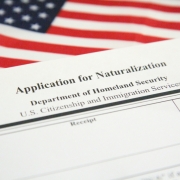The Economic Cost and Rejection Probability of Immigrants Self-Representing or Using Notarios for USCIS Applications
By Brian Figeroux, Esq.
The process of applying for legal immigration status or work permits in the United States can be complex and costly. Many immigrants, due to financial constraints or lack of awareness, either self-represent or seek the help of unauthorized immigration consultants, often referred to as “notarios.” Unfortunately, errors in these applications can lead to costly delays, rejections, or even deportation risks.
This article provides an analysis of the economic cost and rejection probability when immigrants self-represent or use a notario instead of hiring a licensed immigration attorney. We will also introduce a formula to estimate lost earnings due to application delays and the potential financial impact of deportation risks.
Understanding the Risks of Self-Representation or Using Notarios
- The Complexity of Immigration Applications
The U.S. Citizenship and Immigration Services (USCIS) processes a wide range of applications, from work permits to green cards and naturalization. Each application requires:
- Properly completed forms
- Supporting evidence (e.g., financial records, employment letters, proof of residence)
- Adherence to deadlines and procedural requirements
Mistakes in these areas can lead to rejection or Requests for Evidence (RFEs), causing significant delays.
- The Role of Notarios and Their Legal Limitations
Unlike licensed immigration attorneys, notarios:
- Are not authorized to provide legal advice
- Often lack knowledge of immigration laws
- May submit incomplete or incorrect applications
- Cannot represent clients in court or appeals
Many immigrants mistakenly trust notarios, believing them to be equivalent to attorneys, leading to financial loss and legal vulnerability.
- Consequences of Application Errors
- Delays: USCIS processing times can be lengthy. Any errors can result in additional months or even years of waiting.
- Rejections: A rejected application requires re-filing and re-payment of fees.
- Deportation Risk: If an individual’s legal status expires due to a denied application, they may face removal proceedings.
Economic Costs of Delays and Rejections
To quantify the financial burden, we introduce a lost earnings formula based on delays caused by errors.
- Estimating Lost Earnings Due to Delayed Work Permits
Many immigrants rely on work authorization (EAD – Employment Authorization Document) to legally work in the U.S. If their application is delayed or rejected, they may lose months of wages.
Lost Earnings Formula:
LE=(W×H)×DLE = (W \times H) \times DLE=(W×H)×D
Where:
- LELELE = Lost Earnings
- WWW = Hourly wage of the immigrant
- HHH = Number of hours worked per week
- DDD = Delay in weeks caused by errors
For example, if an immigrant earns $18 per hour, works 40 hours per week, and their application is delayed by 12 weeks due to an RFE:
LE=(18×40)×12=8,640LE = (18 \times 40) \times 12 = 8,640LE=(18×40)×12=8,640
Thus, the applicant loses $8,640 in wages due to the delay.
- Costs of Refiling Due to Rejection
USCIS fees are non-refundable. If an application is rejected, the immigrant must pay again. Here are some common fees:
| Application Type | USCIS Fee | Common Delay Due to Errors | Rejection Probability (Self/Notario) |
|---|---|---|---|
| Work Permit (EAD) | $410-$495 | 3-6 months | 25-35% |
| Green Card (I-485) | $1,140 + $85 (biometrics) | 6-12 months | 20-30% |
| Citizenship (N-400) | $640 | 3-6 months | 10-20% |
If an applicant’s green card application is rejected due to a mistake, they could be forced to reapply, paying another $1,225 while waiting an additional 6-12 months.
- Deportation Risk and Economic Impact
If an applicant’s immigration status expires due to a failed or delayed application, they may become subject to deportation. The cost of deportation includes:
- Lost future earnings
- Legal defense fees (up to $10,000 or more)
- Emotional and social costs of family separation
Comparing Legal Representation vs. Notarios or Self-Representation
To better understand the financial risk, we compare the cost and rejection probability of three scenarios:
| Application Method | Cost | Rejection Risk | Estimated Lost Earnings (if delayed) |
|---|---|---|---|
| Self-Representation | USCIS Fee Only | 20-35% | $5,000 – $12,000 |
| Notario | $500 – $2,000 + USCIS Fee | 30-50% | $6,000 – $15,000 |
| Immigration Attorney | $2,000 – $5,000 + USCIS Fee | 5-15% | $1,000 – $3,000 |
Hiring an immigration attorney significantly reduces the risk of rejection, increasing the likelihood of approval on the first attempt, which minimizes lost earnings and avoids unnecessary expenses.
Policy Considerations and Solutions
- Improving Access to Legal Aid
To help immigrants avoid costly mistakes, policymakers should consider:
- Expanding pro bono legal services
- Providing low-cost legal clinics
- Strengthening consumer protections against fraudulent notarios
- Education and Awareness
Many immigrants are unaware of their rights and legal options. Government agencies and non-profits should focus on:
- Hosting workshops on USCIS applications
- Offering guides in multiple languages
- Partnering with trusted community organizations
- Technology-Based Solutions
Legal tech platforms, such as AI-driven legal form review or mobile applications, can help detect errors before submission, reducing rejection rates.
Serious Consequences
The decision to self-represent or rely on a notario can have serious economic consequences for immigrants applying for legal status in the U.S. The risks of application errors include lost wages due to delays, additional filing fees for rejections, and in worst cases, the risk of deportation.
The data suggests that while hiring an immigration attorney may have a higher upfront cost, it significantly reduces rejection probability and long-term financial loss. To protect immigrants, expanding access to legal aid and increasing awareness about immigration fraud are critical steps forward.
Immigrants should carefully evaluate their options and, whenever possible, seek professional legal assistance to navigate the complex USCIS application process efficiently and avoid unnecessary financial and legal hardships.
Copyright © 2025. Brian Figeroux Esq., The Law Firm of Figeroux & Associates.












Leave a Reply
Want to join the discussion?Feel free to contribute!